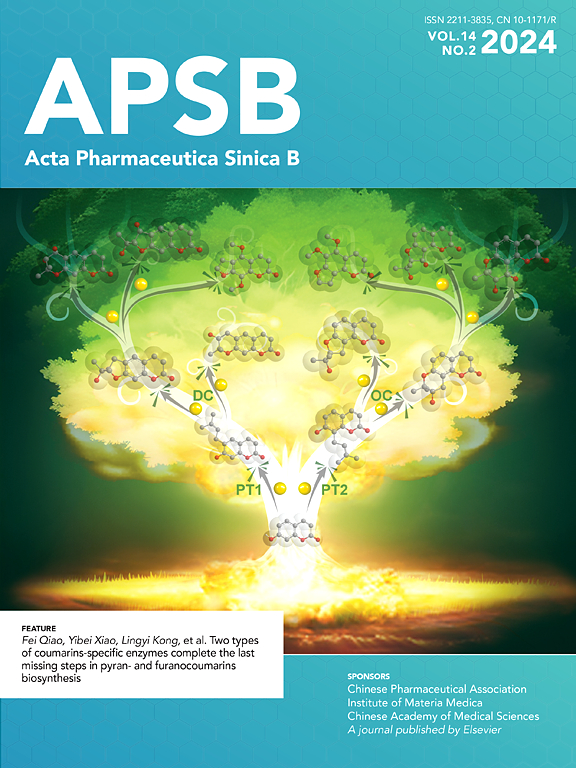In situ tumor cell engineering reverses immune escape to enhance immunotherapy effect
IF 14.7
1区 医学
Q1 PHARMACOLOGY & PHARMACY
引用次数: 0
Abstract
The underlying cause of low response rates to existing immunotherapies is that tumor cells dominate tumor immune escape through surface antigen deficiency and inducing tumor immunosuppressive microenvironment (TIME). Here, we proposed an in situ tumor cell engineering strategy to disrupt tumor immune escape at the root by restoring tumor cell MHC-I/tumor-specific antigen complex (MHC-I/TSA) expression to promote T-cell recognition and by silencing tumor cell CD55 to increase the ICOSL+ B-cell proportion and reverse the TIME. A doxorubicin (DOX) and dual-gene plasmid (MAC pDNA, encoding both MHC-I/ASMTNMELM and CD55-shRNA) coloaded drug delivery system (LCPN@ACD) with tumor targeting and charge/size dual–conversion properties was prepared. LCPN@ACD-induced ICD promoted DC maturation and enhanced T-cell activation and infiltration. LCPN@ACD enabled effective expression of MHC-I/TSA on tumor cells, increasing the ability of tumor cell recognition and killing. LCPN@ACD downregulated tumor cell CD55 expression, increased the proportion of ICOSL+ B cells and CTLs, and reversed the TIME, thus greatly improving the efficacy of αPD-1 and CAR-T therapies. The application of this in situ tumor cell engineering strategy eliminated the source of tumor immune escape, providing new ideas for solving the challenges of clinical immunotherapy.

原位肿瘤细胞工程逆转免疫逃逸,增强免疫疗法效果
现有免疫疗法反应率低的根本原因是肿瘤细胞通过表面抗原缺乏和诱导肿瘤免疫抑制微环境(TIME)主导了肿瘤免疫逃逸。在此,我们提出了一种肿瘤细胞工程策略,通过恢复肿瘤细胞MHC-I/肿瘤特异性抗原复合物(MHC-I/TSA)表达以促进T细胞识别,以及沉默肿瘤细胞CD55以增加ICOSL B细胞比例并逆转TIME,从根本上破坏肿瘤免疫逃逸。研究人员制备了具有肿瘤靶向和电荷/大小双转换特性的多柔比星(DOX)和双基因质粒(MAC pDNA,同时编码MHC-I/ASMTNMELM和CD55-shRNA)共载给药系统(LCPN@ACD)。LCPN@ACD诱导的ICD促进了DC的成熟,增强了T细胞的活化和浸润。LCPN@ACD能使肿瘤细胞上的MHC-I/TSA有效表达,从而提高识别和杀伤肿瘤细胞的能力。LCPN@ACD 下调了肿瘤细胞 CD55 的表达,增加了 ICOSL B 细胞和 CTL 的比例,逆转了 TIME,从而大大提高了 PD-1 和 CAR-T 疗法的疗效。这种肿瘤细胞工程策略的应用消除了肿瘤免疫逃逸的源头,为解决临床免疫治疗难题提供了新思路。
本文章由计算机程序翻译,如有差异,请以英文原文为准。
求助全文
约1分钟内获得全文
求助全文
来源期刊

Acta Pharmaceutica Sinica. B
Pharmacology, Toxicology and Pharmaceutics-General Pharmacology, Toxicology and Pharmaceutics
CiteScore
22.40
自引率
5.50%
发文量
1051
审稿时长
19 weeks
期刊介绍:
The Journal of the Institute of Materia Medica, Chinese Academy of Medical Sciences, and the Chinese Pharmaceutical Association oversees the peer review process for Acta Pharmaceutica Sinica. B (APSB).
Published monthly in English, APSB is dedicated to disseminating significant original research articles, rapid communications, and high-quality reviews that highlight recent advances across various pharmaceutical sciences domains. These encompass pharmacology, pharmaceutics, medicinal chemistry, natural products, pharmacognosy, pharmaceutical analysis, and pharmacokinetics.
A part of the Acta Pharmaceutica Sinica series, established in 1953 and indexed in prominent databases like Chemical Abstracts, Index Medicus, SciFinder Scholar, Biological Abstracts, International Pharmaceutical Abstracts, Cambridge Scientific Abstracts, and Current Bibliography on Science and Technology, APSB is sponsored by the Institute of Materia Medica, Chinese Academy of Medical Sciences, and the Chinese Pharmaceutical Association. Its production and hosting are facilitated by Elsevier B.V. This collaborative effort ensures APSB's commitment to delivering valuable contributions to the pharmaceutical sciences community.
 求助内容:
求助内容: 应助结果提醒方式:
应助结果提醒方式:


